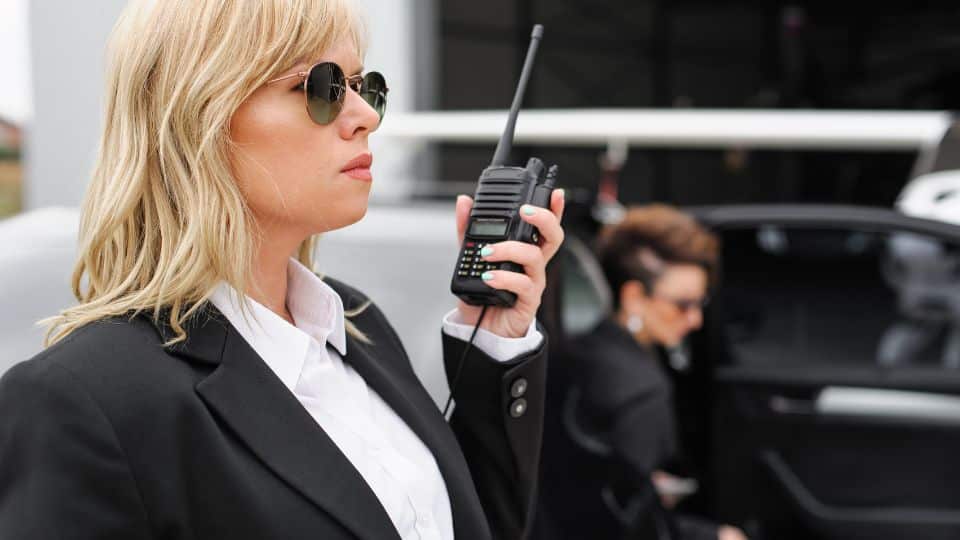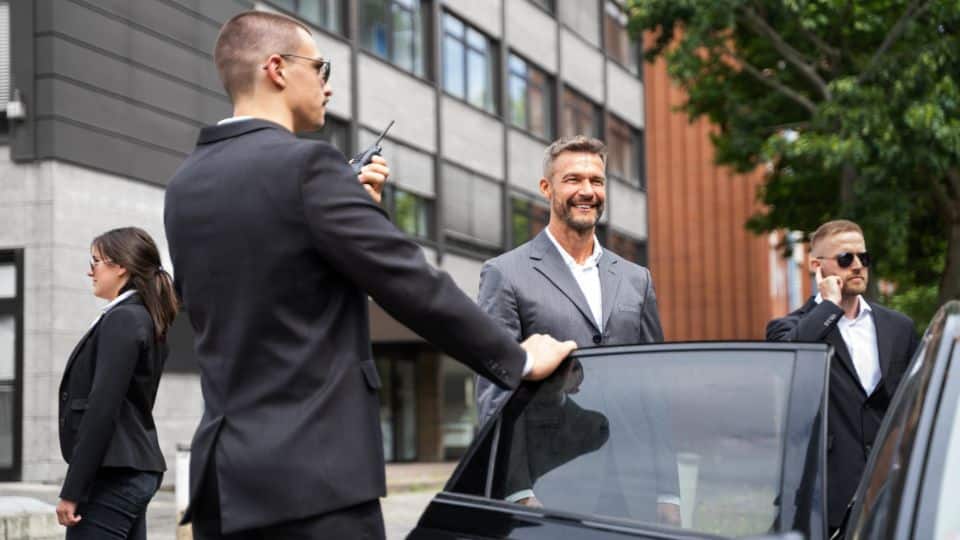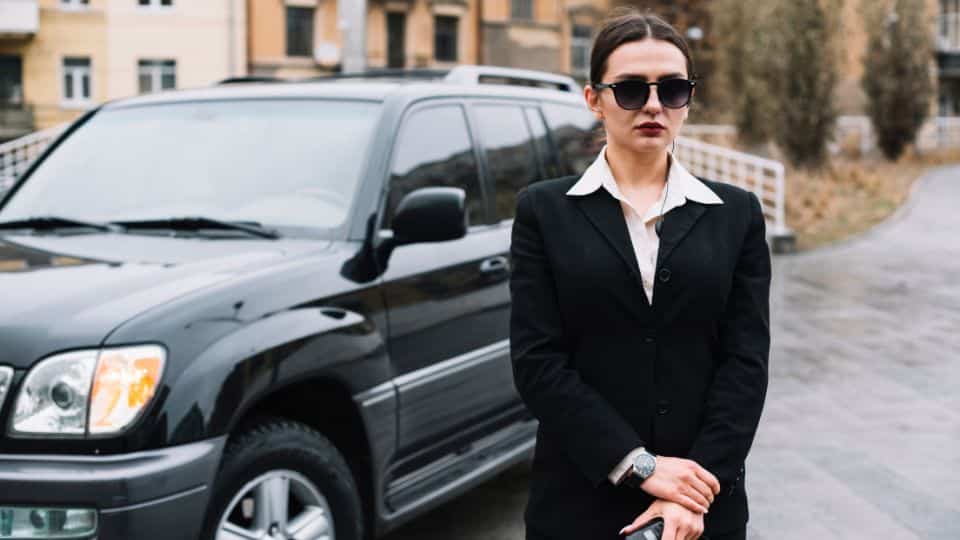When you think of a bodyguard, you probably imagine a large, imposing man, maybe with a background in the military or law enforcement. Or, if the image isn’t that specific, you probably at least imagine a man. Security, in general, is certainly still a majority-male industry–figures from the Australian Bureau of Statistics in 2016 said that women still only made up 14% of all workers in security–but this is changing. More women are moving into security positions, and they’re carving out a niche as close protection operatives, or bodyguards, in particular. Keep reading to find out why many employers think women are a good choice for bodyguard roles, the kinds of clients that require the kind of discreet close protection women excel at, and how to become a bodyguard, regardless of your sex.
Misconceptions
First, let’s tackle a couple of persistent myths about female bodyguards.
Women Are Too Weak To Be Bodyguards
It’s true that women generally have less size and strength than men, but close protection is one area within the security industry where many clients may prefer to hire someone less physically imposing and more unobtrusive to draw less attention to themselves.
There Is Less Demand For Female Bodyguards
This may have been the case years ago, but the demand for female bodyguards is exploding as clients realise some of the unique advantages of having a female bodyguard (of which, more later). And more women are joining the industry, recognising this demand. The International Bodyguard Association’s Gillian Dunne says that ‘the number of female bodyguards has increased tenfold in just under ten years.’
Advantages Of Female Bodyguards
The advantages women are said to have in close protection fall roughly under two categories: the innate characteristics some people in the security profession believe women have that equip them for the role and situational factors that occur on the job for bodyguards that might make the choice of a woman more suitable.
What Characteristics Of Women Make Them Good Bodyguards?
Although we can’t say that all women (or men) have a particular attribute as part of their personality, some people in the security industry insist that female bodyguards have some characteristics that set them apart.
Intuitiveness
‘Women’s intuition’ is an old cliché, but many people in close protection have observed that women have a special ability to sense when things are off. As it’s a bodyguard’s job to be prepared for every eventuality, this can only be a help on the job. A bodyguard must be able to intuit when a threat is about to appear out of nowhere.
Ability To Multitask
It’s said that women can divide their attention between several things at once. This can be useful when a female bodyguard accompanies her client through a loud, jostling crowd.
Talent For Conflict Resolution
Partly because of their inherent abilities and partly because they can’t rely as much on strength, women are thought to be better at using negotiation to de-escalate a situation. This can help prevent tense situations from turning into physical confrontations.
Ability To Relate To Children
Sometimes bodyguards must protect whole families, and where this is the case, children may find women less intimidating and easier to relate to.
What Are The Situational Advantages Of Having A Female Bodyguard?
Aside from whatever characteristics women may or may not have, there are some situations where having a female bodyguard is a definite advantage. You may notice that the following advantages are all different aspects of a single one: the relative inconspicuousness of female bodyguards.
Female Bodyguards Can Blend In Better
When a nightclub owner chooses a security guard, it’s a benefit if that employee is large and looks intimidating, but that isn’t necessarily the case for clients who want to hire bodyguards. When it comes to VIPs like celebrities or politicians, it’s often better for a bodyguard to be able to pass as a friend, a nanny or a PA, and that’s easier for an ordinary-looking woman than it is for a big man, especially when the client they’re protecting is female, too.
Female Bodyguards Can Go Where A Man Can’t
Unlike a male bodyguard, a female bodyguard can go anywhere a woman can go. Close protection is all about staying near the client and heading off potential risks, so a male bodyguard is at a big disadvantage if his client goes into a public bathroom or gym change room.
Female Bodyguards Can Be A Better Choice In Family Disputes
Most people who hire bodyguards are VIPs of some kind, but this isn’t always the case. One situation where someone who isn’t particularly rich or famous might enlist the help of a bodyguard is when a woman is in the middle of a bitter divorce or is otherwise at risk from a dangerous former partner or stalker. In this instance, a female bodyguard may be perceived as less provocative by a violent or unstable former partner.
Female Bodyguards May Be Better In Some Cultural Environments
In some regions and cultures, it’s unacceptable for women to interact with (or be seen interacting with) men who aren’t part of their families. When this is the case, hiring a female bodyguard can keep women safe without violating cultural norms.
Female Bodyguards Can Be Better In High-Risk Countries
When a VIP has business opportunities in a dangerous country where the risk of kidnapping or other violence is greater than at home, a discreet female bodyguard can protect them without the implied slight to their hosts.
Disadvantages Of Being A Female Bodyguard
The main disadvantage of a female bodyguard is, of course, the smaller average size of women. Although bodyguards must be in good physical condition and have some self-defence training, strength is not the biggest priority, even when the client doesn’t need to keep a low profile. As the self-described first female bodyguard in the UK, Jacquie Davis, says, brains are more important for the job than brawn.
Types Of VIPs Who May Need Bodyguard Protection
Sometimes an ordinary person may hire a bodyguard (for example, in situations like the family disputes mentioned above), but most of the people engaging in the services of a bodyguard are in the public eye in some way or are extremely rich, or both. Here are some examples of the kind of VIPs who may need careful, unobtrusive close protection.
Politicians
Politicians often need to mingle among crowds, especially while campaigning. Usually, the worst security risk they face is the odd heckler, but the threat of assassination is real, as we’ve seen in the past with four different American presidents and, more recently, the former Japanese prime minister Shinzo Abe.
Artists
Artists can be the focus of controversy and strong public feelings and can occasionally be in danger from unstable individuals. The most high-profile example of an artist being menaced by a member of the public is the shooting of Andy Warhol by Valerie Solanas in 1968, which left him traumatised and with physical injuries that affected him for the rest of his life.
Athletes
Athletes are increasingly looking at hiring bodyguards, especially those in high-paying leagues like the NBA and NFL, who have experienced a wave of attacks in the last twenty years or so.
Actors
Well-known actors have long understood the value of security, but the murder of Rebecca Schaeffer by a fan in 1989 was a landmark, prompting the first laws against stalking. Demand for close protection in Hollywood is stronger than ever–due to a recent crime wave in Los Angeles, one LA security agency reports that its ‘revenues have doubled from January on, every month’ in 2022.
Ultra-High-Net-Worth-Individuals (UHNWI)
Another group that takes security seriously is ultra-high-net-worth-individuals or UHNWI. These are the very rich, technically defined as people with more than $30 million in investable assets. The greatest risk to the physical security of UHNWIs is the threat of kidnapping. Many wealthy people have been kidnapped over the years, usually in attempts to extort money.
Musicians
Due to the greater expectation that they are accessible to fans through social media, musicians are becoming increasingly aware of threats to their safety. It doesn’t help that due to the nature of their job, they take part in well-publicised tours where everyone knows where they are. Like politicians, they’re often expected to meet and greet the public, which provides dangerous opportunities for people with bad intentions to get close.
How To Become A Bodyguard
When it comes to training and employment, the path to becoming a bodyguard is the same for men and women. Many bodyguards of either sex come to the job from a background in law enforcement or the military, but that’s not mandatory if you want to get into the industry. You can also start from the ground floor by becoming a security guard–after all, a bodyguard is a type of security guard–and then specialising with further training.
Personal Requirements
A lot of the requirements for bodyguards are things that either come with time and experience or can be learned, but there are some things that good bodyguards have that are just a part of their character. What attributes should a good bodyguard have?
- Confidence
- Good situational awareness
- Honesty and integrity
- Good physical fitness
- Communication skills
- Good judgement
Other Skills
Other skills that can benefit bodyguards are any that can make it easier for them to accompany clients wherever they go for work or recreation. Such skills can include skiing, water sports or horse riding.
Age
Security courses generally demand that you be over 18 to enrol–unsurprising given that you have to be over 18 to actually work as a security guard.
Background Check
To get any kind of security licence in Australia, you’ll need to undergo a criminal history check and agree to have your fingerprints taken and kept on file. The check is to ensure you don’t have any disqualifying offences in your past. What these are can vary from one state or territory to another, but in Queensland, for example, they include murder, unlicensed firearm possession and impersonating a police officer.
First Aid
First aid is mandatory for security guards in Australia. If you begin by enrolling in a Certificate II in Security Operations (see below), you’ll get your first aid qualification as a unit of competency in that qualification.
Certificate II In Security Operations
Certificate II In Security Operations is the minimum level of training required to become a licensed security guard in Australia. You don’t need any previous study to get in, but as with becoming a security guard or bodyguard, you must be over 18, have no disqualifying offences come up during a background check, and have basic physical fitness. You must also have basic literacy and numeracy skills, which may be evaluated before enrolment with a Language Literacy and Numeracy (LLN) Test.
The Certificate II in Security Operations covers a range of core security skills and knowledge you’ll need to build on during further study if you want to go on to become a bodyguard. You will study:
- Basic self-defence techniques
- How to remove someone from the premises
- How to conduct a patrol to monitor property
- Monitoring and controlling crowd behaviour
- Escorting people and valuables
- Performing quality security services for a range of clients
- How to screen people and items
- Communication skills for the security industry
- Monitoring access and departure of people and vehicles to and from premises
- Working as part of a team within the bounds of legal and procedural requirements
- Managing intoxicated people
- Maintaining security by following WHS, emergency response and evacuation procedures
- Conducting risk assessments to determine responses to security risks
- The Certificate II in Security Operations also incorporates the first aid training you will need for security work as a unit of competency
To find out more about the Certificate II in Security Operations, take a look at this article.
Certificate II In Close Protection Operations
This qualification is the more specific training meant to teach you how to become a bodyguard. The page for this qualification at training.gov.au says there are no prerequisites for entry, but individual trainers may insist that you have Certificate II in Security Operations before enrolling in this qualification. It will also be easier to get work as a bodyguard if you’ve had work experience as a licensed security guard, rather than trying to get close protection work without experience after completing the Certificate III in Close Protection Operations.
This qualification covers close protection skills, including:
- Planning and implementing close protection services
- Managing conflict through negotiation
- Controlling people using empty-hand techniques
- Determining and implementing responses to security risks
- Coordinating the monitoring and control of crowd behaviour
- Controlling people using batons
- Restraining people from using handcuffs
- Preparing and presenting evidence in court
- Defending people using spray
- Safe driving behaviours
- Conducting vehicle inspections
- Managing evacuations
- Advanced first aid training
Now that you know more about the unique role of female bodyguards, you may want to consider close protection as a career. If that’s the case, enrolling in a Certificate II in Security Operations with a registered training organisation is the best route to making it happen.



